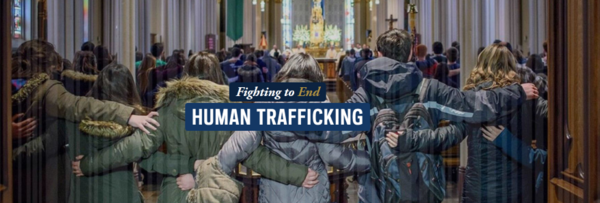Imago Dei | ILI Alumni - A Force for Good
Originally Published in ILI Insights E-Newsletter, October 2020
While it’s certainly true that dozens of Inspired Leadership (ILI) fellows have successfully completed the program, it’s becoming increasingly apparent that the work they begin at Notre Dame—on themselves and on the world—will never see a finish line.
One such example is the Imago Dei initiative. It’s a passion project begun by five 2019-20 fellows: Karen Cunningham, Bill Miller, Bill Schenher, Vickie Seeger, and Phil White. These are the core members, but as it is with most undertakings of this cohort, it’s an “all-in,” and they regularly share updates and progress so that the rest of the cohort can get involved from time to time.
The effort began through a series of discussions—the group sought to deepen their connection to Notre Dame by more officially joining the “Force for Good.” After research and reflection, they were compelled to take up the fight against human trafficking.
They chose to christen their effort “Imago Dei,” which means “image of God.”

“One of the things you find in learning about trafficking, is that it robs people of their dignity, which is an even deeper wound than losing your freedom or getting beat up,” says White, “And Imago Dei is as much about healing the perpetrators as it is the victims—we want to restore the image of God within all people involved in the trafficking process.”
As they began to peel back the layers, the team was alarmed to learn how pervasive human trafficking is around the world and how many forms it takes. White says there are essentially four categories: sex trafficking, labor trafficking, child soldiers, and organ “donation.”
“It’s happening in our neighborhoods, and it’s a risk for our children, because the Internet and the dark web come right to them on their phones,” says White, an attorney. He explains that trafficking crosses a line into illegality when there is coercion—somehow acquiring control of someone to use their body. It happens in communities big and small, developed and developing. In some villages, desperate and impoverished parents send their children away with an individual they have grown to trust, who promises a better life. Instead, the children are put to work in mines, factories, or as domestic servants. In some circumstances, they are killed for their organs.
“There are hundreds of thousands of people from good families who have ended up in this web,” says White. “Many more of us than you may think are enablers and potential victims.”
Potential victims—yes that is a fear—but enablers? It’s more acute than “turning a blind eye.” White explains that some of the products we buy were harvested or built (in part or fully) by trafficked laborers. Low prices of food, electronics, hardware, and clothing—they might be resting on the exhausted backs of real people, young and old.
So while the problem of human trafficking is unwieldly and uncomfortable, Imago Dei hopes to shine a light on this dark subject, arguing we can’t just ignore it and hope it goes away or even depend on government and legislation.
“It can’t be rooted out by police; it involves work for each of us as individuals,” says White. “Part of it is the way we form people—we need to start teaching that we are all in this big web of humanity—and part of it is anti-poverty programs and education. But what we want to focus on are the small things people can do today. It’s manageable. Learn a little about it. Tell your friends. And do one thing different.”
This year Imago Dei is funding three summer service learning opportunities through the University’s Center for Social Concerns, working with student groups to bring expert speakers to club meetings, collaborating with the Higgins Labor Program to create a speaker series on labor trafficking, and attending industry seminars to deepen their own knowledge of this complex issue.
White says the initiative has been embraced by the University, and he admires the way people have leaned in and offered time and resources. But he is mostly grateful for the support from the Imago Dei core team.
“We learned from the ILI there are lots of things that you can’t control and can't fix, but you need to take a step.” he says. “If we do it as a group, taking that step makes it less scary. Yes, this is a terrible challenge, a deeply rooted problem that touches so many different people, but with the group holding hands, we can take a step in the right direction and with God's help hopefully have a positive impact.”
With God’s help, maybe even cross the finish line.
##
To learn more about Imago Dei, visit their website at imagodei.nd.edu
For more information about human trafficking, Imago Dei recommends Polaris, Walk Free Global Slavery Index, U.S. Catholic Sisters Against Human Trafficking, and the U.S. Department of State Trafficking In Persons Report.
To learn more about leaders in the fight against human trafficking, Imago Dei recommends Selah Freedom, Grace Farms, International Justice Mission (IJM), and Breaking Free.